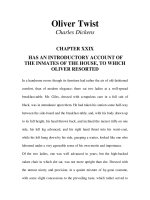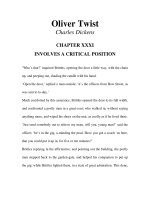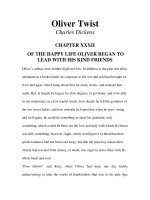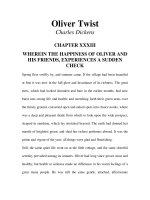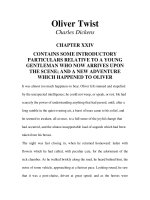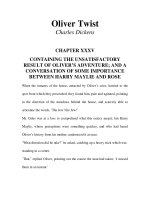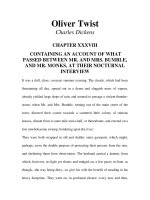Tài liệu LUYỆN ĐỌC TIẾNG ANH QUA TÁC PHẨM VĂN HỌC-SHORT STORY BY O’HENRY -The Red Roses Of Tonia doc
Bạn đang xem bản rút gọn của tài liệu. Xem và tải ngay bản đầy đủ của tài liệu tại đây (35.72 KB, 15 trang )
SHORT STORY BY O’HENRY
The Red Roses Of Tonia
A trestle burned down on the International Railroad. The south- bound from
San Antonio was cut off for the next forty-eight hours. On that train was
Tonia Weaver's Easter hat.
Espirition, the Mexican, who had been sent forty miles in a buckboard from
the Espinosa Ranch to fetch it, returned with a shrugging shoulder and hands
empty except for a cigarette. At the small station, Nopal, he had learned of
the delayed train and, having no commands to wait, turned his ponies toward
the ranch again.
Now, if one supposes that Easter, the Goddess of Spring, cares any more for
the after-church parade on Fifth Avenue than she does for her loyal outfit of
subjects that assemble at the meeting-house at Cactus, Tex., a mistake has
been made. The wives and daughters of the ranchmen of the Frio country put
forth Easter blossoms of new hats and gowns as faithfully as is done
anywhere, and the Southwest is, for one day, a mingling of prickly pear,
Paris, and paradise. And now it was Good Friday, and Tonia Weaver's
Easter hat blushed unseen in the desert air of an impotent express car,
beyond the burned trestle. On Saturday noon the Rogers girls, from the
Shoestring Ranch, and Ella Reeves, from the Anchor-O, and Mrs. Bennet
and Ida, from Green Valley, would convene at the Espinosa and pick up
Tonia. With their Easter hats and frocks carefully wrapped and bundled
against the dust, the fair aggregation would then merrily jog the ten miles to
Cactus, where on the morrow they would array themselves, subjugate man,
do homage to Easter, and cause jealous agitation among the lilies of the
field.
Tonia sat on the steps of the Espinosa ranch house flicking gloomily with a
quirt at a tuft of curly mesquite. She displayed a frown and a contumelious
lip, and endeavored to radiate an aura of disagreeableness and tragedy.
"I hate railroads," she announced positively. "And men. Men pretend to run
them. Can you give any excuse why a trestle should burn? Ida Bennet's hat
is to be trimmed with violets. I shall not go one step toward Cactus without a
new hat. If I were a man I would get one."
Two men listened uneasily to this disparagement of their kind. One was
Wells Pearson, foreman of the Mucho Calor cattle ranch. The other was
Thompson Burrows, the prosperous sheepman from the Quintana Valley.
Both thought Tonia Weaver adorable, especially when she railed at railroads
and menaced men. Either would have given up his epidermis to make for her
an Easter hat more cheerfully than the ostrich gives up his tip or the aigrette
lays down its life. Neither possessed the ingenuity to conceive a means of
supplying the sad deficiency against the coming Sabbath. Pearson's deep
brown face and sunburned light hair gave him the appearance of a schoolboy
seized by one of youth's profound and insolvable melancholies. Tonia's
plight grieved him through and through. Thompson Burrows was the more
skilled and pliable. He hailed from somewhere in the East originally; and he
wore neckties and shoes, and was made dumb by woman's presence.
"The big water-hole on Sandy Creek," said Pearson, scarcely hoping to make
a hit, "was filled up by that last rain."
"Oh! Was it?" said Tonia sharply. "Thank you for the information. I suppose
a new hat is nothing to you, Mr. Pearson. I suppose you think a woman
ought to wear an old Stetson five years without a change, as you do. If your
old water-hole could have put out the fire on that trestle you might have
some reason to talk about it."
"I am deeply sorry," said Burrows, warned by Pearson's fate, "that you failed
to receive your hat, Miss Weaver--deeply sorry, indeed. If there was
anything I could do--"
"Don't bother," interrupted Tonia, with sweet sarcasm. "If there was
anything you could do, you'd be doing it, of course. There isn't."
Tonia paused. A sudden sparkle of hope had come into her eye. Her frown
smoothed away. She had an inspiration.
"There's a store over at Lone Elm Crossing on the Nueces," she said, "that
keeps hats. Eva Rogers got hers there. She said it was the latest style. It
might have some left. But it's twenty-eight miles to Lone Elm."
The spurs of two men who hastily arose jingled; and Tonia almost smiled.
The Knights, then, were not all turned to dust; nor were their rowels rust.
"Of course," said Tonia, looking thoughtfully at a white gulf cloud sailing
across the cerulean dome, "nobody could ride to Lone Elm and back by the
time the girls call by for me to-morrow. So, I reckon I'll have to stay at home
this Easter Sunday."
And then she smiled.
"Well, Miss Tonia," said Pearson, reaching for his hat, as guileful as a
sleeping babe. "I reckon I'll be trotting along back to Mucho Calor. There's
some cutting out to be done on Dry Branch first thing in the morning; and
me and Road Runner has got to be on hand. It's too bad your hat got
sidetracked. Maybe they'll get that trestle mended yet in time for Easter."
"I must be riding, too, Miss Tonia," announced Burrows, looking at his
watch. "I declare, it's nearly five o'clock! I must be out at my lambing camp
in time to help pen those crazy ewes."
Tonia's suitors seemed to have been smitten with a need for haste. They bade
her a ceremonious farewell, and then shook each other's hands with the
elaborate and solemn courtesy of the Southwesterner.
"Hope I'll see you again soon, Mr. Pearson," said Burrows.
"Same here," said the cowman, with the serious face of one whose friend
goes upon a whaling voyage. "Be gratified to see you ride over to Mucho
Calor any time you strike that section of the range."
Pearson mounted Road Runner, the soundest cow-pony on the Frio, and let
him pitch for a minute, as he always did on being mounted, even at the end
of a day's travel.
"What kind of a hat was that, Miss Tonia," he called, "that you ordered from
San Antone? I can't help but be sorry about that hat."
"A straw," said Tonia; "the latest shape, of course; trimmed with red roses.
That's what I like--red roses."
"There's no color more becoming to your complexion and hair," said
Burrows, admiringly.
"It's what I like," said Tonia. "And of all the flowers, give me red roses.
Keep all the pinks and blues for yourself. But what's the use, when trestles
burn and leave you without anything? It'll be a dry old Easter for me!"
Pearson took off his hat and drove Road Bunner at a gallop into the
chaparral east of the Espinosa ranch house.
As his stirrups rattled against the brush Burrows's long-legged sorrel struck
out down the narrow stretch of open prairie to the southwest.
Tonia hung up her quirt and went into the sitting-room.
"I'm mighty sorry, daughter, that you didn't get your hat," said her mother.
"Oh, don't worry, mother," said Tonia, coolly. "I'll have a new hat, all right,
in time to-morrow."
When Burrows reached the end of the strip of prairie he pulled his sorrel to
the right and let him pick his way daintily across a sacuista flat through
which ran the ragged, dry bed of an arroyo. Then up a gravelly hill, matted
with bush, the hoarse scrambled, and at length emerged, with a snort of
satisfaction into a stretch of high, level prairie, grassy and dotted with the
lighter green of mesquites in their fresh spring foliage. Always to the right
Burrows bore, until in a little while he struck the old Indian trail that
followed the Nueces southward, and that passed, twenty-eight miles to the
southeast, through Lone Elm.
Here Burrows urged the sorrel into a steady lope. As he settled himself in the
saddle for a long ride he heard the drumming of hoofs, the hollow "thwack"
of chaparral against wooden stirrups, the whoop of a Comanche; and Wells
Pearson burst out of the brush at the right of the trail like a precocious
yellow chick from a dark green Easter egg.
Except in the presence of awing femininity melancholy found no place in
Pearson's bosom. In Tonia's presence his voice was as soft as a summer
bullfrog's in his reedy nest. Now, at his gleesome yawp, rabbits, a mile
away, ducked their ears, and sensitive plants closed their fearful fronds.
"Moved your lambing camp pretty far from the ranch, haven't you,
neighbor?" asked Pearson, as Road Runner fell in at the sorrel's side.

